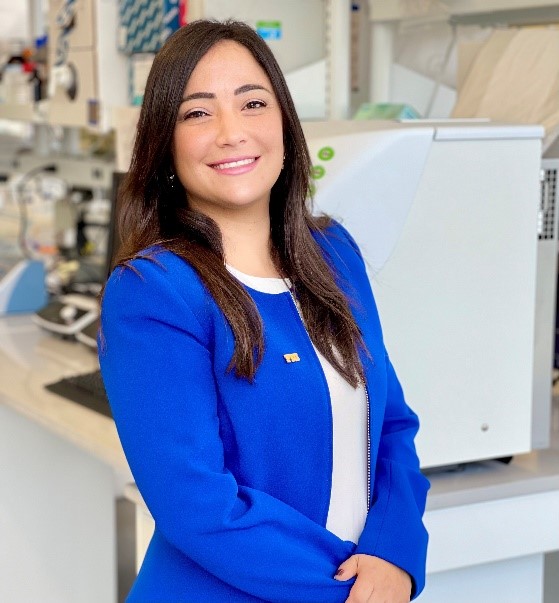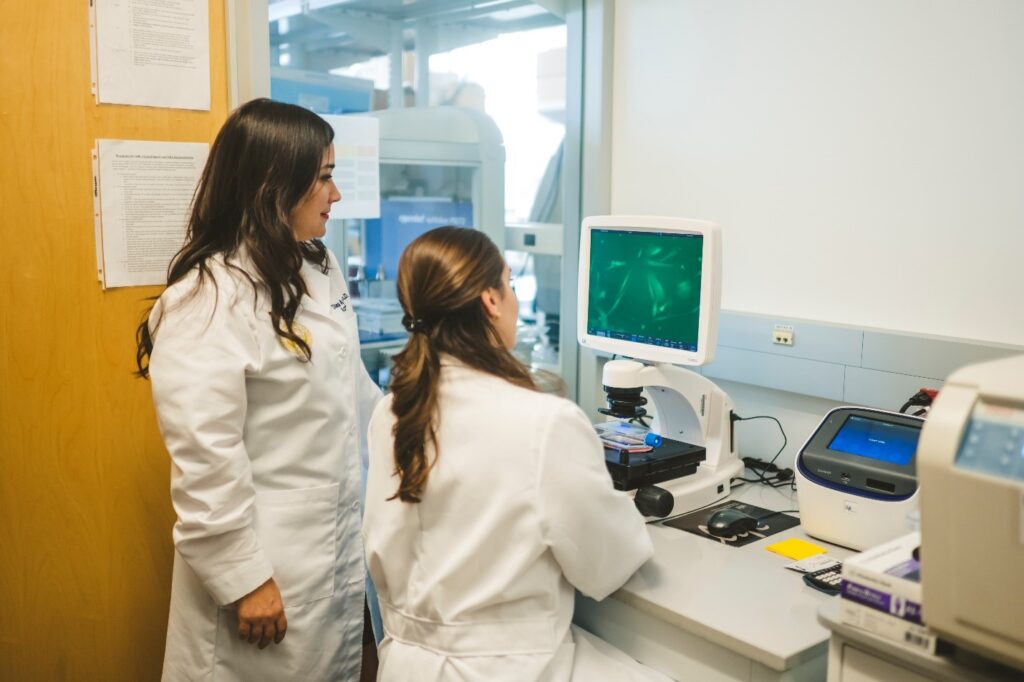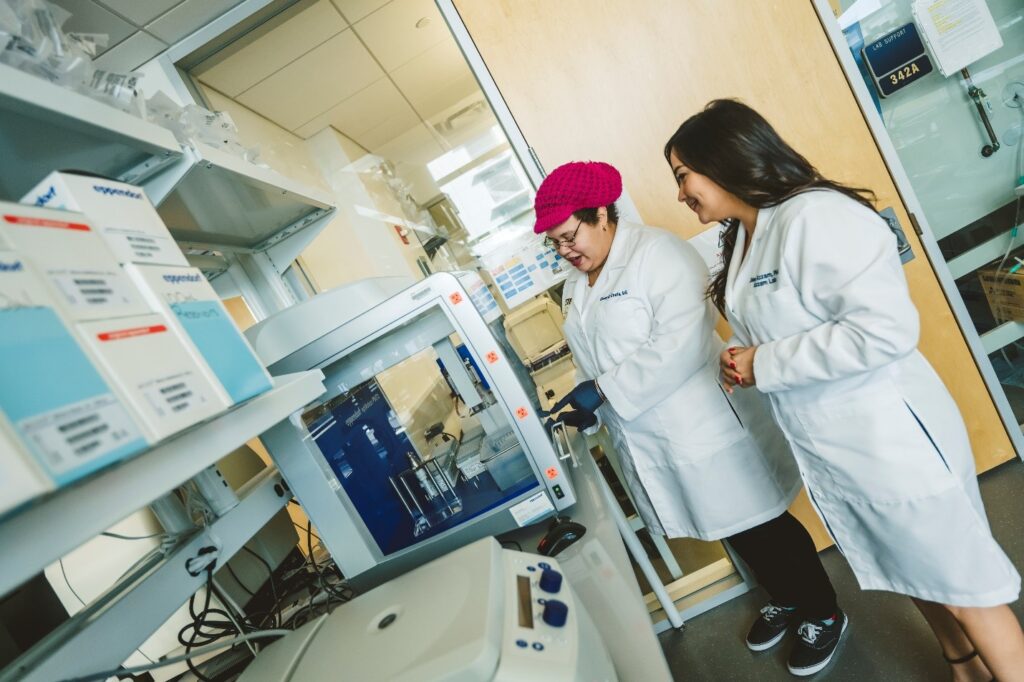Diana Azzam, Florida International University – Neuroinflammation Protein Linked to Worse Survival in Men with Glioblastoma
 On Florida International University Week: Why do men have worse survival rates from brain tumors?
On Florida International University Week: Why do men have worse survival rates from brain tumors?
Diana Azzam, assistant professor in the department of environmental health sciences, explains why.
Dr. Diana Azzam earned her PhD in Biochemistry & Molecular Biology from the University of Miami in 2012. Her research has focused on the identification, functional characterization and targeting of therapy resistant and metastatic cancer stem cells in the most lethal forms of breast and ovarian cancers. Based on her work and publications, she received the 2014 Women in Cancer Research scholar award from the American Association for Cancer Research. During her postdoctoral training at the Center for Therapeutic Innovation, Dr. Azzam implemented a patient-specific ex vivo high-throughput drug screening platform for personalized cancer therapy. This novel iterative functional/genomics approach was a multidisciplinary collaborative project with oncologists that enabled clinical application of individualized treatments for refractory patients with no alternative options. Significantly higher response rates were observed in patients whose treatment was based on drug screening and mutation profiling compared to non-guided therapy. In addition, Dr. Azzam optimized a high-throughput screening approach to identify novel drugs that target therapy-resistant cancer stem cell subsets in a tumor. Her research efforts led to the identification of new cancer stem-cell specific functions of histone methyltransferases (HMT) and histone deacetylases (HDAC) in breast and ovarian cancer.
Dr. Azzam joined the Department of Environmental Health Sciences at the Florida International University in April 2018. She is a grant recipient of the Florida Department of Health first-ever Live Like Bella Pediatric Cancer Research Initiative (http://www.floridahealth.gov/newsroom/2018/03/030818-live-like-bella-2018.html) that funds an ongoing multi-center clinical trial, in collaboration with Nicklaus Children’s hospital, on individualized treatments in children with advanced cancers. The study enrolls children with relapsed and/or refractory leukemias and solid tumors to implement ex vivo drug sensitivity in combination with genomic profiling to guide clinical decision making and provide novel therapeutic options for children (https://news.fiu.edu/2020/a-lifesaving-option-for-pediatric-cancer-patients).
In addition, she received a $400,000 grant from the Cornelia T. Bailey Foundation, in collaboration with Nicklaus Children’s Hospital, for an observational study that takes biopsies of individual children’s tumor tissues and tests standard of care drugs. Azzam will assess predictive value of functional precision medicine approach in newly diagnosed childhood sarcomas (Stempel professor to assess predictive value of personalized medicine approach to childhood sarcomas – Robert Stempel College of Public Health & Social Work).
She has also initiated the first study that FIU has conducted with Cleveland Clinic Florida on adult patients with advanced sarcomas. The research, funded by a $350,000 grant from the Scott R. MacKenzie Foundation, focuses on the clinical utility of drug sensitivity testing and genomic profiling to treat sarcomas, one of the most common types of aggressive, malignant tumors (https://communitynewspapers.com/florida-international-university/fiu-and-cleveland-clinic-florida-to-collaborate-on-personalized-cancer-treatment-research).
Neuroinflammation Protein Linked to Worse Survival in Men with Glioblastoma
Glioblastoma is the most common malignant brain tumor. It’s deadlier in males than females and we wanted to learn why.
Through our research, we found a connection between a widely used biomarker of neuroinflammation – known as translocator protein 18 kDa or TSPO – and survival outcomes in glioblastoma patients.
Our findings suggest that a variation in the protein’s structure correlates with worse survival outcomes in males than females.
This is important because glioblastoma has sex-specific differences.
Glioblastoma is found in adults and is 1.6 times more likely to affect males than females – and the survival outcome of males is worse than females. Each year, approximately 12,000 people in the U.S. are diagnosed with glioblastoma.
The median survival time of glioblastoma patients is 12 to 14 months, and less than 7% of patients survive more than five years. Thus, better treatments and strategies for improving prognosis are urgently needed as there is no cure for the disease.
Our research team analyzed the blood samples of 441 glioblastoma patients to evaluate the correlation between the patients’ clinical outcomes and the TSPO polymorphic variant rs6971. This is one of the most frequent polymorphisms, or variants, found in humans.
Compared with female glioblastoma patients, males with the variant had shorter overall and progression-free survival times. There was no association between the variant and survival time in females.
Our study suggests that the variant has potential for use as a prognostic biomarker in glioblastoma patients. In the future, this can potentially help patients receive personalized treatments and, perhaps, one day, lead us to a cure.
Read More:
[FIU] – Neuroinflammation protein linked to worse survival in men with glioblastoma




